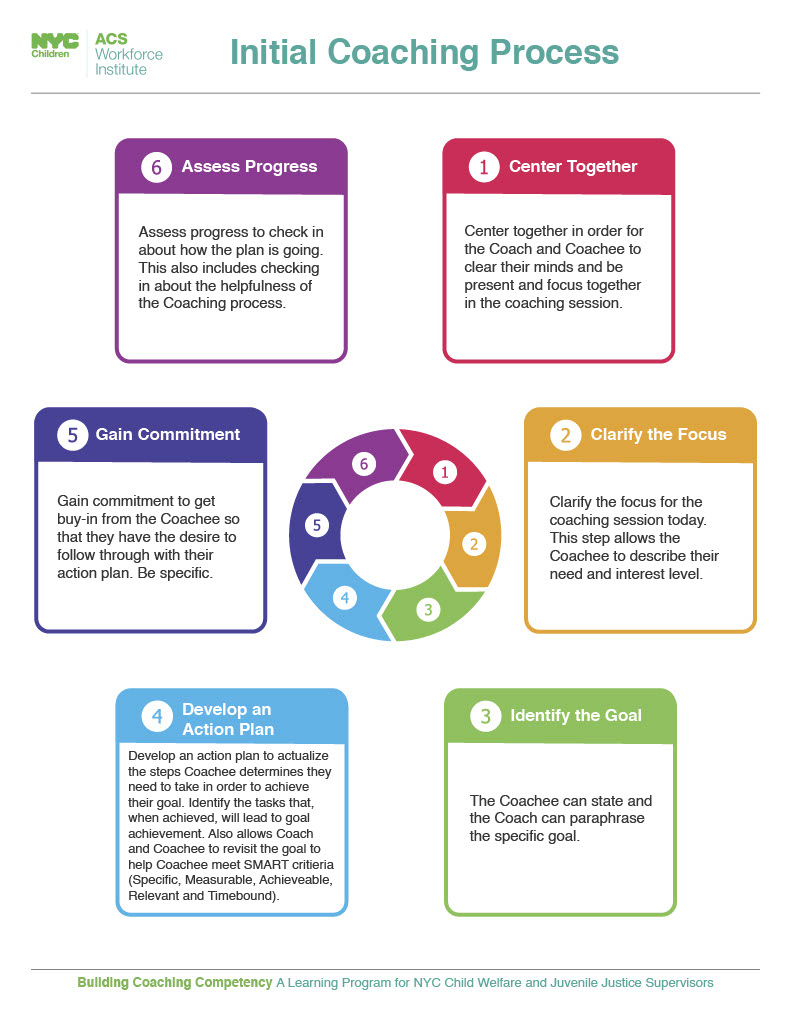Building Coaching Competency

Building Coaching Competency (BCC), one of two foundational learning programs at the ACS Workforce Institute, was piloted and launched in 2016 to support NYC child welfare supervisors and managers in being able to enhance their supervisory practice with direct service staff. BCC is a two day in person learning program that is designed to build strong, capable, and well-trained supervisors and managers that can use effective coaching strategies with staff to ensure that children and families receive the highest quality of care. In the BCC program, supervisors and managers learn and practice effective strategies to create a collaborative strength based culture with their staff. The program introduces skills and concepts that contribute to the long-term professional development of supervisors and staff and helps to build confidence, boost morale, and encourage critical thinking skills amongst staff members.
With the recognition that promoting a strengths-based learning community that supports coaching also requires that coaching be valued by the administrators of the organization, the ACS Workforce Institute developed a modified BCC learning program for child welfare Senior Administrators. This learning program allows leadership to gain a better understanding of the coaching process and better support supervisors in the implementation of coaching.
To demonstrate its ongoing commitment to creating a coaching culture and support the transfer of learning from training to on the job application, the ACS Workforce Institute has developed a multi-level coaching program that supports implementation and is made easily accessible to supervisory and managerial staff. In addition to BCC, our two day foundational learning program, the coaching implementation support offered by the ACS Workforce Institute includes a 30 minute e-Learn video that introduces learners to the coaching concepts, in person coaching collaboratives designed to build learner confidence and commitment to using the coach approach, monthly conference calls to support staff that is not able to attend an in person workshop, onsite technical assistance to support learners in overcoming barriers to implementation, and a series of skill refreshers that aim to increase learner proficiency in using each of the coaching skills. Each stage of the coaching program is designed to increase enthusiasm around coaching and provide ongoing learning and practice opportunities.
In 2017, additional resources were allocated for the ACS Workforce Institute, in collaboration with their partners in child protection and juvenile justice, to integrate program based coaches to further support ACS supervisors and managers to competently and consistently use the coach approach as part of supervision with their teams, and create opportunities for staff to practice core foundational skills including strengths-based engagement, motivational interviewing, and safety and risk assessment and decision making. Program based coaches work closely with ACS leadership to implement an array of research based transfer of learning strategies to support the competent and consistent use of these critical foundational skills. Consistent skill practice coupled with strengths-based feedback promotes the transfer of learning to daily practice with families.
Through coaching, child welfare supervisory and managerial staff will understand their essential role in promoting staff to apply newly learned skills and knowledge into their everyday practice. The long-term outcome of these efforts is that direct service staff has the necessary knowledge and skills to engage children and families, better assess safety and risk, make sound casework decisions, and provide high quality services to the children and families.


